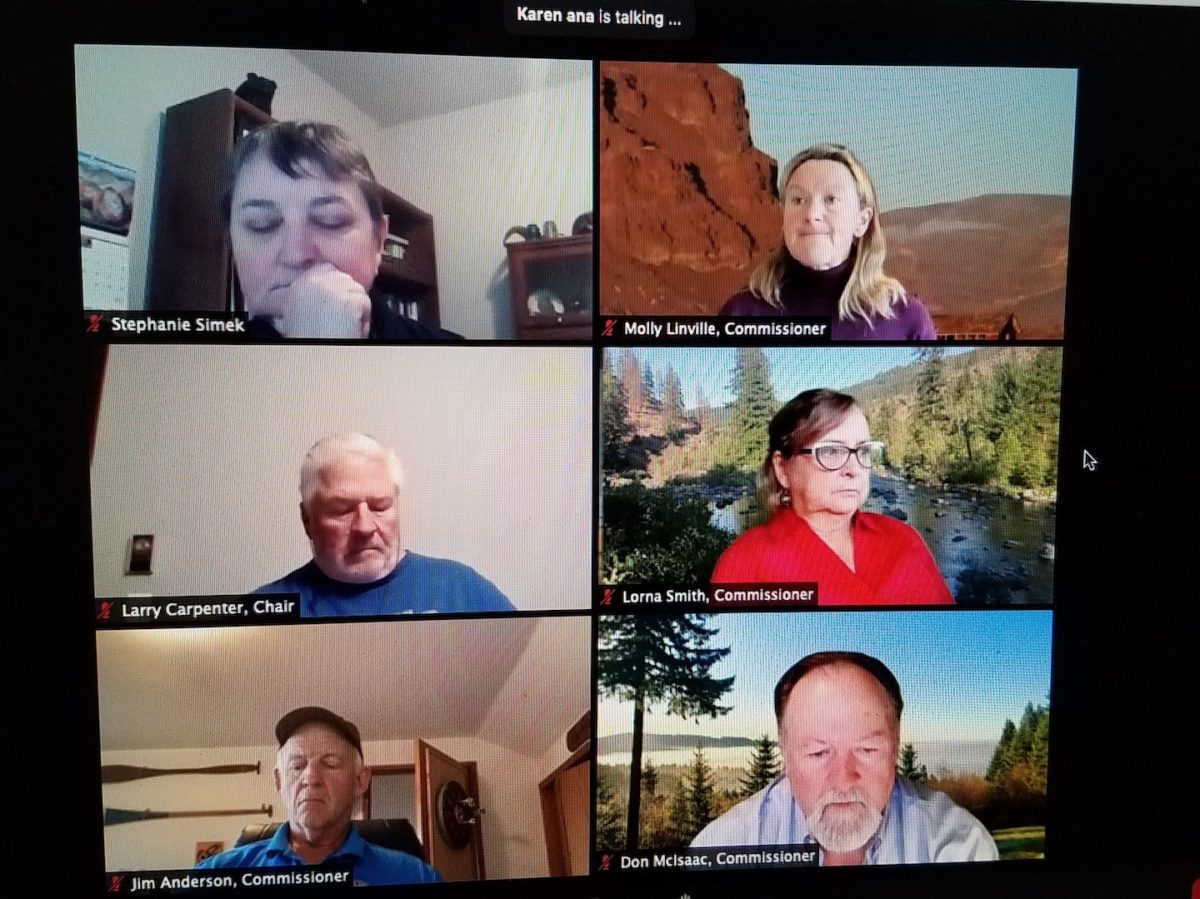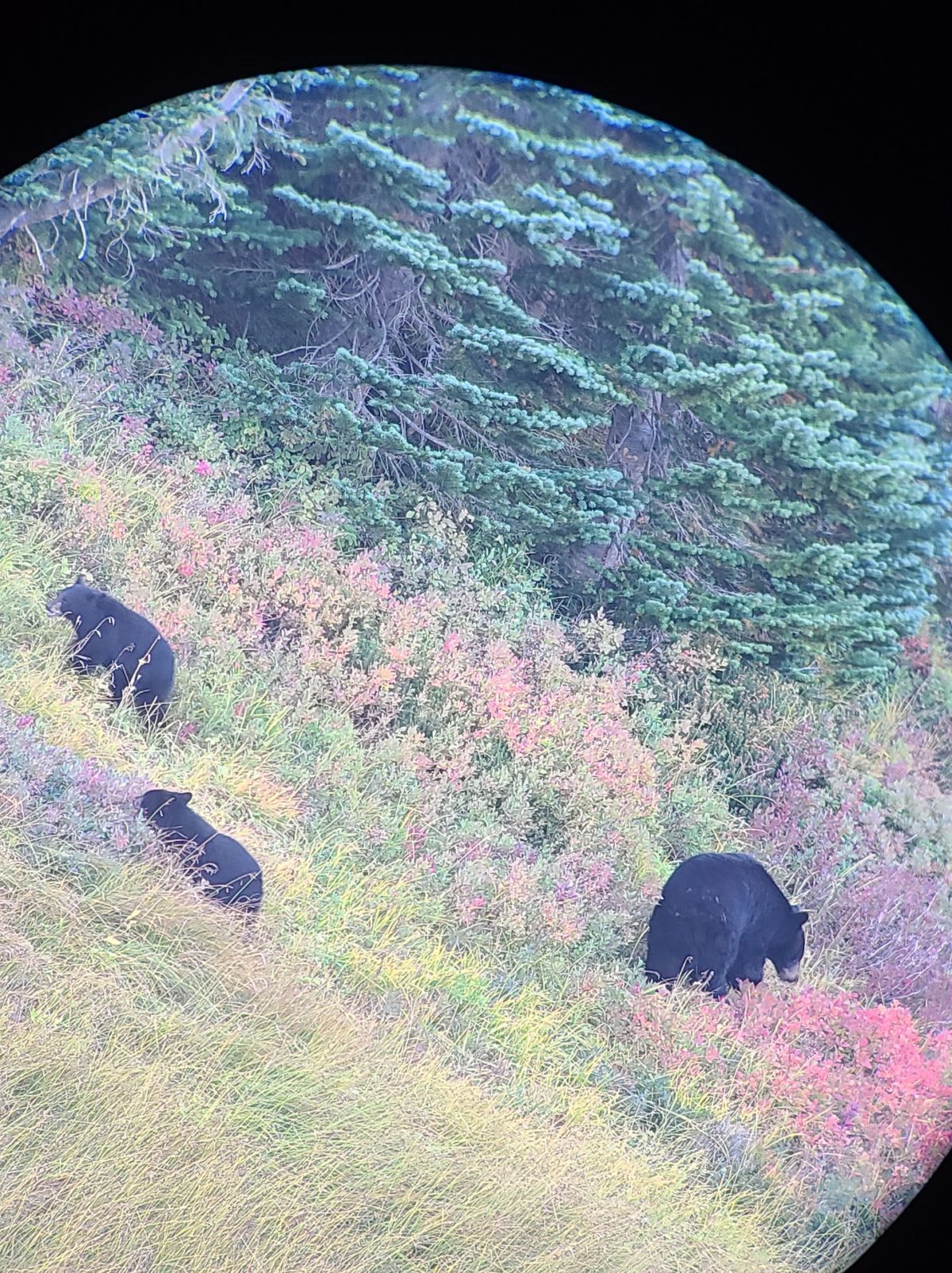
End Of Washington Spring Black Bear Hunt Called For
The future of Washington’s permit-only spring black bear hunt took a beating during a public hearing before the Fish and Wildlife Commission this afternoon, with the overwhelming majority of 53 callers saying it should end or asking that the vote on 2022’s season be delayed.

Speaker after speaker after speaker after speaker – literally, the first 33 and the final 17 – spoke against it in two-minute-or-less blurbs, terming it unethical, a trophy hunt – a pry point – an outrage, “recreational assassination” and exceptionally cruel.
Many were aghast that Evergreen State hunters were only asked to not shoot sows with cubs, unlike in Oregon and Idaho where it’s prohibited.
“I beg you,” said Rachel Hayman, to do away with the hunt.
Tammy Domke likened it to a Simpson‘s episode: “It’s nothing more than Bear Whacking Day.”
“It’s not a sport; it’s a slaughter,” Rita Morgan said.
And while some did give props to WDFW carnivore manager Stephanie Simek for her fine presentation on the rationale of the hunt dating back to 1969 and next year’s proposed 664 permits – I wrote about that yesterday – they wanted more data or called BS that the hunt reduces timber damage, human conflict and deer fawn and elk calf losses.
Jay Brueggeman, a retired biologist who said he hunted, claimed bears were an “inconsequential” problem for tree farmers compared to wildfire and bugs, while hunting and weather had more of an impact on ungulate numbers, two of WDFW’s stated reasons for the season.
It was clear that many speakers had recently read talking points or been directed to speak out. Others identified themselves as representing Center for Biological Diversity, Washington Wildlife First, The Bear League, Mountain Lion Foundation, Northwest Animal Rights Network, Humane Society of the United States, or did not, despite clear allegiances.
Some like Martha Hall also had long memories back to last December’s promise that in approving the 2021 season in an 8-1 vote (which also sparked a lawsuit by Hall and her sister), the commission would do a deeper dive into the issue.
All together, it was an impressive organized turnout that in the end numerically represented almost exactly the nonhunting percentage of the state’s population.
True, many hunters will have been out looking for deer today or heading to camp for the second weekend of rifle season and will use that as a crutch for why they didn’t testify, or did do their due diligence beforehand and filed written comments on the matter.
But less than a handful of sportsmen also took time out of their Friday afternoon to get on the phone or Zoom and defend the spring season.
Marie Neumiller of the Spokane-based Inland Northwest Wildlife Council took issue with arguments that the hunt was all about stroking egos.
“My friends, family and fellow hunters care passionately about wildlife as evidenced by the thousands of volunteer hours that we commit to wildlife conservation each year. We value the high-quality meat and fat from our bear harvests and use it to feed our families and friends while ensuring that there is little to no waste,” she stated.
Referencing this morning’s news about the “alarming mortality” seen in elk calves – 104 of 125 collared this spring, 83.2 percent – in the predator-rich Blue Mountains, Neumiller asked the commission to approve next year’s hunt as proposed.
And Robert Morgan of Grays Harbor County noted that the timing of the spring season wasn’t actually as unusual as it was being made out to be. He pointed out that, just as deer and elk hunting overlaps the fall rut and spring is the time to target strutting tom turkeys looking for hens, June is when to be out in search of a boar on the trail of sows.
At least two other hunters had been in the cue to speak, but for whatever reason weren’t able to. WDFW made an announcement October 11 that 8 a.m. today was the deadline to sign up to speak.
Early in the day, Commission Chair Larry Carpenter said that almost 100 were expected to provide input. He added later that written and spoken comment had equal weight.

Regardless, it was a double-barreled earful for the eight-member Fish and Wildlife Commission and this bookie has now lowered the odds of next year’s hunt coming off to even money, if not a bit below 50-50.
It likely will depend on the quality of answers WDFW staffers come up with in response to a lengthy list member Don McIsaac drew up for his decision.
He asked for science on how many females actually have cubs each spring – state bear manager Simek reported that just one of the 124 reported taken this spring was lactating – if killing boars helps reduce infanticide; data on ungulate and timber damage mitigation; and an analysis of a possible prohibition on the taking of sows.
Two commissioners – Molly Linville and Jim Anderson – were slightly uneasy with that last one, arguing WDFW would likely get better data out of hunters if they thought they could report their hunts without getting in trouble or had accidentally shot a female, which are indistinguishable from males if there are no cubs nearby, and feared they would be fined.
But for Commissioner Lorna Smith, today’s public testimony appeared to cement her opinion that whatever language hunting managers might use to describe the spring season, it is “a hunt of opportunity and not a prescriptive solving of any issues.”
Some who read my material will disagree, but I generally don’t like to butt into stories – too much, anyway. I’m making an exception in this case to say that this is an inflection point, hunters.
Those among us who took the position that the public comment period for the 2022 spring bruin season would be a fantastic time to propose a pie-in-the-sky expansion to over-the-counter tags across the state would do better to refocus their efforts on what might still be attainable, preserving the special permit season at some level as a management tool and focused even more so on boars.
Or we can fight the tide as if it’s still 1968 in Washington. We might have the high ground that there is little if any conservation concern about this hunt, but today is evidence that the emotional weight opponents can bring to, er, bear on it is formidable.
This morning WDFW extended the period for public comment through 5 p.m., Monday, November 1.
At this moment, the commission is still scheduled to make a final decision on the 2022 season at its Friday, November 19 meeting. Stay tuned.
